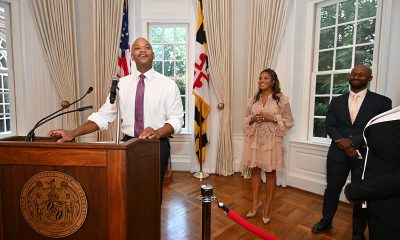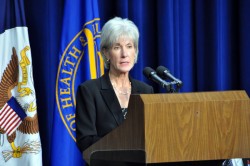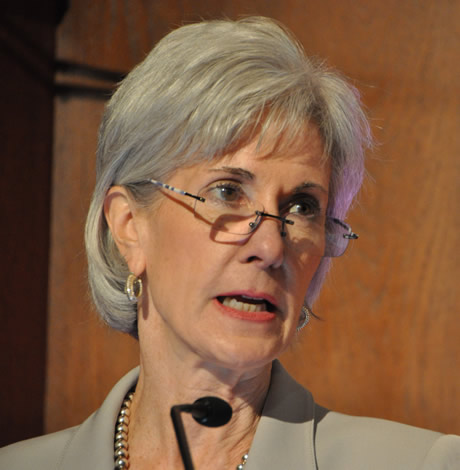National
HHS unveils plan to start data collection on LGBT health
Department will incorporate questions on sexual orientation into NHIS by 2013

The Department of Health & Human Services unveiled on Wednesday new details about plans to collect data on the LGBT population as part of federal health surveys.
According to a statement from the department, HHS will incorporate questions on sexual orientation into the National Health Interview Survey by 2013. Further, the department plans to hold a series of research roundtables with experts to determine the best way to collect data related to gender identity.
Secretary of Health & Human Services Kathleen Sebelius already announced last week that her department would start collecting health data on LGBT people during a news conference in response to a question from the Washington Blade. The information unveiled on Wednesday sheds greater light on the plan to start collecting this information.
In a statement, Sebelius emphasized that collecting health data on the LGBT population could lead to reduction of health disparities faced by the LGBT community.
“Health disparities have persistent and costly effects for minority communities, and the whole country,” Sebelius said. “Today we are taking critical steps toward ensuring the collection of useful national data on minority groups, including for the first time, LGBT populations. The data we will eventually collect in these efforts will serve as powerful tools and help us in our fight to end health disparities.”
According to a fact sheet from HHS, the administration has the authority to collect data on the LGBT population as part of the health care reform law passed by Congress last year, which allows the department the opportunity to collect demographic data to further improve understanding of health care disparities.
“In the past, identifying disparities and effectively monitoring efforts to reduce them has been limited by a lack of specificity, uniformity, and quality in data collection and reporting procedures,” the fact sheet states. “Consistent methods for collecting and reporting health data will help us better understand the nature of health problems in the LGBT community.”
The plan from HHS states that limited data on the LGBT community already shows the population is subject to certain health problems more than others. For example, gay and bisexual men make up more than half of new HIV infections in the United States each year; HIV infection among transgender women exceeds 25 percent nationwide; and lesbian and bisexual women are prone to receive less routine care than other women, including breast and cervical cancer screening.
The fact sheets made public on Wednesday outline the path under which the Obama administration plans to start collecting data on individuals based on their sexual orientation and gender identity:
* June to Dec. 2011 — Continue cognitive testing and begin field testing of sexual orientation data collection.
* Summer 2011 — Conduct first roundtable on gender identity data collection development. Complete initial development of sexual orientation data collection questionnaire.
* Winter 2011 — Conduct follow-up roundtable on gender identity data collection.
* Spring 2012 — Conduct and complete initial field testing of sexual orientation data collection. HHS Data Council presents a strategy to include gender identity data collection in HHS surveys.
* Winter 2012 — Conduct and complete large scale field test of sexual orientation data collection.
* 2013 — If the field test is successful, implement new data collection on sexual orientation into the full National Health Interview Survey data collection.
Gary Gates, distinguished scholar at the Williams Institute at University of California in Los Angeles, said the new details on data collection for LGBT people “solidifies the commitment that Secretary Sebelius made last week to provide more and better data” on LGBT health needs.
“As was clearly stated in the findings from the recent Institutes of Medicine report on LGBT health disparities, the need for more data is acute,” Gates said. “I urge HHS to move as quickly as possible to include sexual orientation and gender identity questions on the NHIS.”
Mara Keisling, executive director of the National Center for Transgender Equality, called the commitment from the Obama administration to collect data on the LGBT population “a big deal.”
“When the federal government starts to count us, we will have the proof of the health disparities we all know exist,” Keisling said. “With the data, advocacy for better health programs becomes possible, vital resources can be directed to our community, and better health for transgender people will follow.”
Federal Government
UPenn erases Lia Thomas’s records as part of settlement with White House
University agreed to ban trans women from women’s sports teams

In a settlement with the Trump-Vance administration announced on Tuesday, the University of Pennsylvania will ban transgender athletes from competing and erase swimming records set by transgender former student Lia Thomas.
The U.S. Department of Education’s Office for Civil Rights found the university in violation of Title IX, the federal rights law barring sex based discrimination in educational institutions, by “permitting males to compete in women’s intercollegiate athletics and to occupy women-only intimate facilities.”
The statement issued by University of Pennsylvania President J. Larry Jameson highlighted how the law’s interpretation was changed substantially under President Donald Trump’s second term.
“The Department of Education OCR investigated the participation of one transgender athlete on the women’s swimming team three years ago, during the 2021-2022 swim season,” he wrote. “At that time, Penn was in compliance with NCAA eligibility rules and Title IX as then interpreted.”
Jameson continued, “Penn has always followed — and continues to follow — Title IX and the applicable policy of the NCAA regarding transgender athletes. NCAA eligibility rules changed in February 2025 with Executive Orders 14168 and 14201 and Penn will continue to adhere to these new rules.”
Writing that “we acknowledge that some student-athletes were disadvantaged by these rules” in place while Thomas was allowed to compete, the university president added, “We recognize this and will apologize to those who experienced a competitive disadvantage or experienced anxiety because of the policies in effect at the time.”
“Today’s resolution agreement with UPenn is yet another example of the Trump effect in action,” Education Secretary Linda McMahon said in a statement. “Thanks to the leadership of President Trump, UPenn has agreed both to apologize for its past Title IX violations and to ensure that women’s sports are protected at the university for future generations of female athletes.”
Under former President Joe Biden, the department’s Office of Civil Rights sought to protect against anti-LGBTQ discrimination in education, bringing investigations and enforcement actions in cases where school officials might, for example, require trans students to use restrooms and facilities consistent with their birth sex or fail to respond to peer harassment over their gender identity.
Much of the legal reasoning behind the Biden-Harris administration’s positions extended from the 2020 U.S. Supreme Court case Bostock v. Clayton County, which found that sex-based discrimination includes that which is based on sexual orientation or gender identity under Title VII rules covering employment practices.
The Trump-Vance administration last week put the state of California on notice that its trans athlete policies were, or once were, in violation of Title IX, which comes amid the ongoing battle with Maine over the same issue.
New York
Two teens shot steps from Stonewall Inn after NYC Pride parade
One of the victims remains in critical condition

On Sunday night, following the annual NYC Pride March, two girls were shot in Sheridan Square, feet away from the historic Stonewall Inn.
According to an NYPD report, the two girls, aged 16 and 17, were shot around 10:15 p.m. as Pride festivities began to wind down. The 16-year-old was struck in the head and, according to police sources, is said to be in critical condition, while the 17-year-old was said to be in stable condition.
The Washington Blade confirmed with the NYPD the details from the police reports and learned no arrests had been made as of noon Monday.
The shooting took place in the Greenwich Village neighborhood of Manhattan, mere feet away from the most famous gay bar in the city — if not the world — the Stonewall Inn. Earlier that day, hundreds of thousands of people marched down Christopher Street to celebrate 55 years of LGBTQ people standing up for their rights.
In June 1969, after police raided the Stonewall Inn, members of the LGBTQ community pushed back, sparking what became known as the Stonewall riots. Over the course of two days, LGBTQ New Yorkers protested the discriminatory policing of queer spaces across the city and mobilized to speak out — and throw bottles if need be — at officers attempting to suppress their existence.
The following year, LGBTQ people returned to the Stonewall Inn and marched through the same streets where queer New Yorkers had been arrested, marking the first “Gay Pride March” in history and declaring that LGBTQ people were not going anywhere.
New York State Assemblywoman Deborah Glick, whose district includes Greenwich Village, took to social media to comment on the shooting.
“After decades of peaceful Pride celebrations — this year gun fire and two people shot near the Stonewall Inn is a reminder that gun violence is everywhere,” the lesbian lawmaker said on X. “Guns are a problem despite the NRA BS.”
New York
Zohran Mamdani participates in NYC Pride parade
Mayoral candidate has detailed LGBTQ rights platform

Zohran Mamdani, the candidate for mayor of New York City who pulled a surprise victory in the primary contest last week, walked in the city’s Pride parade on Sunday.
The Democratic Socialist and New York State Assembly member published photos on social media with New York Attorney General Letitia James, telling followers it was “a joy to march in NYC Pride with the people’s champ” and to “see so many friends on this gorgeous day.”
“Happy Pride NYC,” he wrote, adding a rainbow emoji.
Mamdani’s platform includes a detailed plan for LGBTQ people who “across the United States are facing an increasingly hostile political environment.”
His campaign website explains: “New York City must be a refuge for LGBTQIA+ people, but private institutions in our own city have already started capitulating to Trump’s assault on trans rights.
“Meanwhile, the cost of living crisis confronting working class people across the city hits the LGBTQIA+ community particularly hard, with higher rates of unemployment and homelessness than the rest of the city.”
“The Mamdani administration will protect LGBTQIA+ New Yorkers by expanding and protecting gender-affirming care citywide, making NYC an LGBTQIA+ sanctuary city, and creating the Office of LGBTQIA+ Affairs.”
-

 U.S. Supreme Court5 days ago
U.S. Supreme Court5 days agoSupreme Court upholds ACA rule that makes PrEP, other preventative care free
-

 U.S. Supreme Court5 days ago
U.S. Supreme Court5 days agoSupreme Court rules parents must have option to opt children out of LGBTQ-specific lessons
-

 Television5 days ago
Television5 days ago‘White Lotus,’ ‘Severance,’ ‘Andor’ lead Dorian TV Awards noms
-

 Maryland5 days ago
Maryland5 days agoWes Moore hosts annual Pride reception








